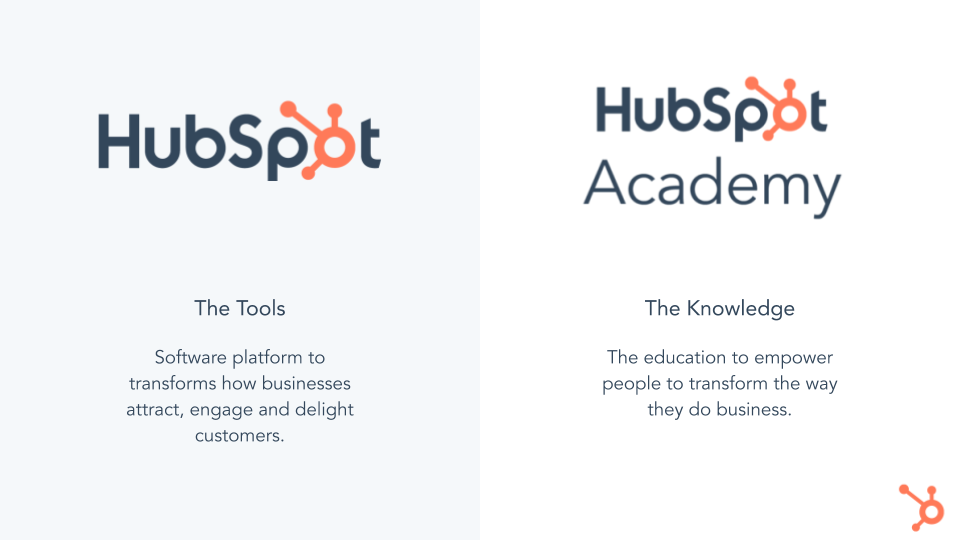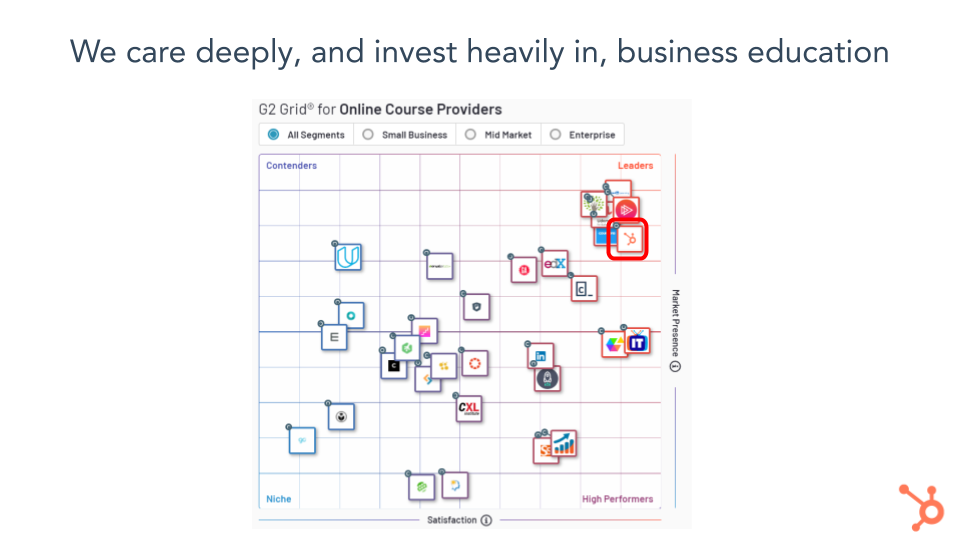This post is a part of Made @ HubSpot, an internal thought leadership series through which we extract lessons from experiments conducted by our very own HubSpotters.
At the end of 2019, the Education Partner Program team at HubSpot had the challenging opportunity of deciding our priorities for the coming year.
The HubSpot Education Partner Program — or EPP — is a community of educators who teach at colleges and universities worldwide that receive free software and support from HubSpot to train the next generation of marketing, sales, and service professionals.
 Supporting and empowering these students and professors is crucial in maintaining a healthy HubSpot ecosystem of future clients and users.
Supporting and empowering these students and professors is crucial in maintaining a healthy HubSpot ecosystem of future clients and users.
Like most teams at HubSpot, we focus maniacally on how to create a positive experience for those who rely on our program – in this case, university professors. To ensure that we were creating such experiences, we first had to identify what novel problems and pain points this audience faces.
Click here to learn more about the Education Partner Program and how you can join.
Identifying Our Audience’s Pain Points
The EPP’s focus is on college students who need to enter the working world with the tools and methodologies they need to help a business grow. We care deeply, and invest heavily in, business education.

Although HubSpot Academy serves thousands of learners across the world, the EPP focuses on education within college and universities. Our team would be remiss if we didn’t acknowledge and adapt to the educational inequity that pervades higher education in the US.
Specifically, we wanted to address the problems below that these issues bring to light:
1. Students need to have experience applying the skills they learn in class to find employment after graduation.
Often, this means they pursue (sometimes unpaid) internships in expensive cities, which can add financial strain to an already expensive college experience.
If HubSpot could find a way that would allow students to contribute virtually to helping solve a real business challenge in their course – all with the added safety net of their instructor being there to answer questions – we prime them for success. Subsequently, if they put this work on their resume, these students demonstrate a work experience that they might have otherwise been unable to find.
2. Educators have a mandate to prepare their students for real business challenges, but this can introduce so many unwelcome variables in the classroom.
Educations only have so many businesses in their rolodex that are open to working with students in their personal or professional network. On top of that, awkward conversations about expectations and due dates on deliverables can turn professors off from the experience completely.
At HubSpot, we have over 78,000 customers, all of whom are hoping to grow their business using our software and many of which could use some help and fresh eyes when approaching new projects. However, we recognized that it wasn’t enough to simply offer our customers; we needed a way for both our customers and our professors to hold themselves accountable to creating fruitful relationships and learning experiences for the students they work with.
3. HubSpot customers don’t always have the bandwidth to complete their many projects.
Although the visible impact of the Education Partner Program is the support we lend professors, we also intend to embedding ourselves deeper into the company and work across the many teams at HubSpot that want their best for our users. As a small team of three, it’s important for us to make a large splash where we can. Working with other teams – and specifically, our Customer Success Team – to help HubSpot customers is mutually beneficial. We wanted to find a solution for our educators while also finding one for our customers. We needed to create safeguards that made sure that business didn’t exploit students’ free labor while making it easy (and pleasant) for a Customer to work with an Educator, and vice versa.
And so, in 2020, we decided to focus on …. applied learning.
Providing a Solution Through Applied Learning
Applied learning is the practice of alternating classroom learning with pre-approved practical, meaningful, and creative contributions of labor in a community or external organization, in a field related to a student’s academic and career goals. Has a HubSpot Customer not updated their lead-generation workflow since the early 2010s? Perhaps some students could come in and provide some suggestions. Does a HubSpot Customer not have the bandwidth to create engaging blog articles to promote their product or service? Have students in a Digital Marketing class provide some articles as their capstone assignment!
As higher education shifted to virtual or hybrid models in 2020, we had a unique value proposition to provide our educators with the opportunity to enhance their students’ employable skills while also providing free work for our customers — many of whom were adapting to the challenges of conducting business almost entirely online and could use the help.
Here’s how we did it.
1. We partnered with the best-in-class software for creating new applied opportunities in the classroom, Riipen.
We first explored what providers already had a foothold in this space. Riipen, a technology platform that facilitates micro-experiential learning opportunities by connecting students with industry partners through in-course assignments or competitions designed by instructors, came far ahead of any other options.
2. We tested, and then tested some more.
Shortly after we decided to work with Riipen, we enlisted some of our most engaged Education Partners and customers to test out the marketplace to see if this was something we could expand to the hundreds more professors in our network.
After a bit of research and conversation, we partnered with (and are eternally grateful for) Tim Marshall at Baldwin Wallace College and Elaine Young and Champlain College. These two educators’ students worked with six diverse HubSpot customers (three each), with much success.
- CAPA The Global Education Network (Boston, MA, USA): Students worked to develop lead-nurturing workflows to promote and encourage study abroad to freshmen college students.
- The Woods (Norway, ME, USA): Students worked to boost online ads and an ecommerce platform for a luxury treehouse in Maine.
- Run Away Travel (Miami, FL, USA): Students created marketing collateral and content for an all-inclusive travel agency.
- Cosmic Booth (Orlando, FL, USA): Students created marketing collateral and content for a commercial photo booth rental business.
- ETTCH (Dublin, Ireland): Students created marketing collateral and content for an educational company that design tools for children coping with anxiety and low self-confidence.
- AirWorks (Boston, MA, USA): Students doubled the amount of pillar pages for an AI start-up.
My colleagues and I attended final presentations that students made to their employers and were impressed with the level of preparation and professionalism from everyone involved.
The Woods saw tremendous growth (500%) in their apparel sales. Run Away Travel and ETTCH in particular had some great feedback on the maturity of the students and the innovative content they provided their businesses.
Given the success of the pilot program, we decided to continue our partnership with Riipen and create even more connections between our customers and educators.
3. We promoted our program internally and collaborated with other teams.
There were several considerations we took into account as we planned to launch our partnership with Riipen at scale.
We needed to make sure that our educators weren’t left without a HubSpot customer to pair with — and vice versa. This meant that our biggest obstacle was going both too fast or too slow in rolling this out. We needed to make sure we were recruiting at an even pace on both sides of the marketplace. For example, if we pressed the gas on recruiting educators to join, we could end up with more educators than we have customers. The opposite also applied. Since we could control the stream of educators who knew about and could sign up for this program, we also had to do the same for our customers.
Enter the Customer Success team at HubSpot. We relied on the Customer Success Managers, or CSMs, to hand-pick “good fit” businesses for this opportunity. We shared the “what” and “why” of our applied learning program through an internal “Applied Learning Resource Center” with small, actionable steps for CSMs that wanted their customers to participate in the program. CSMs then introduced me personally to businesses they considered a good match. We also built out public-facing pages for educators and customers that outlined the goals and responsibilities of each should they participate in the program.
Applied Learning in Times of Uncertainty
While we at HubSpot have always been excited about the prospect of matching customers with educators so that students can gain job-ready skills, these times of economic uncertainty have brought a new sense of urgency. When we experience fundamental changes to how we work and learn, we have to question how we can better prepare ourselves and others to respond to new challenges. The practice of remote-friendly learning has become the new normal for most colleges and universities worldwide, opening the horizons of what virtual leadership and project management looks like when it happens from your kitchen or bedroom desk.
The project-based learnings students undertake with Riipen are always completely virtual experiences. Thus, they’re more flexible and obtainable to a new group of students who could never commit to the tradition 9-5, in-office internship experience.
We have a long way to go to scale this from the highly-personalized, one-on-one outreach we have now to a more automated, self-identifying, opt-in process for customers and educators. Fall 2020 will present some interesting challenges as we prepare to launch this to our Education Partner Community during a time when many are questioning the ability to offer virtual learning — much less virtual applied learning opportunities.
We seek to create 15 more matches between Educators and our Customers (and even more in the Spring) and are confident that we can hit this number. Ultimately, we want to create opportunities for students to graduate with the skills and experiences they need to feel confident in interviews and at their workplaces.
Our partnership with Riipen is a major step in empowering these students and in building a customer base that appreciates the perspectives that these students bring.
Click here to learn more about the Education Partner Program and how you can join.
![]()
Original Entry: Bringing Universities and HubSpot Clients Together: An Experiment in Applied Learning is shared from https://blog.hubspot.com/marketing/hubspot-experiment-applied-learning via https://blog.hubspot.com/marketing
Check out the original post, Bringing Universities and HubSpot Clients Together: An Experiment in Applied Learning that is shared from https://putyourfamilyfirst.wordpress.com/2020/08/20/bringing-universities-and-hubspot-clients-together-an-experiment-in-applied-learning/ via https://putyourfamilyfirst.wordpress.com
No comments:
Post a Comment